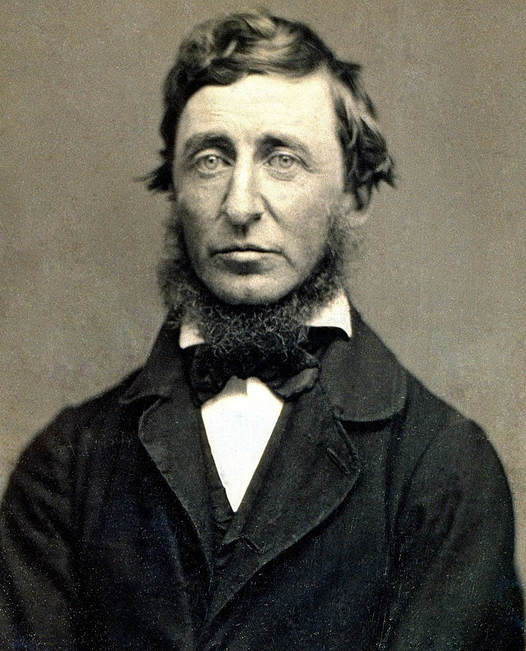The Yankee Encounter with the Shanty Irish: Henry David Thoreau's Poem "I am the little Irish boy"3/24/2018 I am the little Irish boy That lives in the shanty I am four years old today And shall soon be one and twenty I shall grow up And be a great man And shovel all day As hard as I can Down in the deep cut Where the men live Who made the railroad. For supper I have some potato And sometimes some bread And then if it’s cold I go right to bed. I lie on some straw Under my father’s coat My mother does not cry And my father does not scold For I am a little Irish Boy And I’m four years old. Below: Henry David Thoreau (Source: Wikipedia) The above poem, classified as "doggrel" or a nonsense poem, was written by the famous American philosopher and writer Henry David Thoreau in Concord, Massachusetts in 1850. He wrote it at the height of the Irish refugee crisis, when improverished Irish refugees fleeing the Irish potato famine built refugee camps called shantytowns on marginal land. The newcomers mostly worked at menial pick-and-shovel jobs, building roads and railways. Thoreau kept prolific journals. Through them, we learn something about his encounters with his Irish neighbors living in the woods in a shack, just like he was (although he did so out of philosophical choice, they out of bare necessity). The boy’s name was Johnny Riordan. Thoreau first mentioned the boy in a journal entry of November 28, 1850, when he penned the poem. A few weeks later, on December 21, 1851, he became upset about the boy’s condition: “This little mass of humanity, this tender gobbet [?] for the fates, cast into a cold world with a torn lichen leaf wrapped about him…I shudder when I think of the fate of innocence.” On February 8, 1852 Thoreau finally acted. “Carried a new cloak to Johnny Riordan,” he remarked in his journal. Upon giving his gift to the boy, he gained entry to the Riordan shanty. He wrote in his journal, favorably if very condescendingly, that “the shanty was warmed by the simple social relations of the Irish…What if there is less fire on the hearth, if there is more in the heart!” Thoreau’s friend, philosopher Ralph Waldo Emerson, who was also living in Concord and on whose wooded lands Thoreau lived, wrote to Thoreau: “Now the humanity of the town suffers with the poor Irish, who receive but sixty or even fifty cents, for working dark till dark, with a strain and a following-up that reminds me of negro-driving.” A few weeks later, Thoreau wrote back to Emerson positively: “The sturdy Irish arms that do the work are of more worth than oak or maple. Methinks I could look with equanimity upon a long street of Irish cabins and pigs and children reveling in the genial Concord dirt…” In this correspondence, as in his dealings with the Riordan family, Thoreau seems very sympathetic towards his poor Irish neighbors living in their shanties and laboring at building the railroad. And yet…Thoreau was at this very time putting the finishing touches on his masterwork, Walden. In it, he famously and derogatorily denigrates his shanty-Irish neighbor, John Field, for his “inherited Irish poverty” and lectures him for not being able to resist wanting “luxuries” like butter and tea that force him to slave and toil from dawn to dusk, instead of saving his pennies to better his situation. Even better, suggests Thoreau, Field should realize that he should transcend his material needs entirely! And all that coming from a Harvard-educated bachelor who can afford to live in the woods in a shack, not out of necessity but to make a philosophical statement! The poem “I am a little Irish boy”, then perhaps was not meant by Thoreau to be sympathetic, but rather sarcastic. Maybe it's making fun of the boy and the pathetic constraints on his life that have already predestined him to an existence of digging ditches. Nevertheless, the poem can be touching when read in the right spirit. I found this version of it, set to music and sung, that is particularly touching. I hope you enjoy it. PS: At some later point, I hope to write a blog post about Thoreau's journey on a raft down the Merrimack River with his brother, which he covered in his book "A Week on the Concord and Merrimack Rivers" (the Concord River flows into the Merrimack at Lowell).
0 Comments
Leave a Reply. |
|

 RSS Feed
RSS Feed